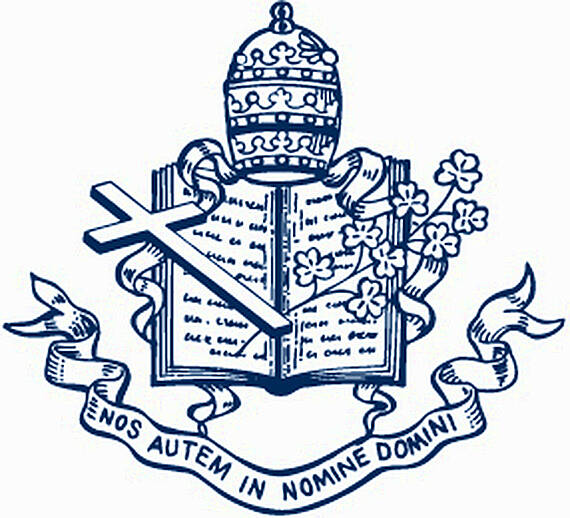Joe Masterson, class '47
1930 -2011

Joe as Bodkin Memorial Prize winner in 1946
The Union was saddened to hear of the passing of Joe Masterson, class '47.
All who passed through the College in the 70's & 80's will know Joe through his four sons; Eric, Raoul, Larry and Philip. All who attend the College today will know Joe through his grandchildren who continue the proud tradition of Masterson family at Castleknock College.
Past men of the 40's, especially the '47 year group will well remember Joe, for he was a popular student who excelled at all that he pursued. He was a fine athlete who played JCT in 1944-45 and again in 1945-46 when he captained the team that narrowly lost the Cup Final to 'Rock. Joe featured prominently in College Opera productions, notably "Patience" in 1945 and "The Gondoliers" in 1946. He excelled at studies featuring in Class Prize Lists in 1944-45, 1945-46 and 1946-47 and won the Bodkin Memorial prize for his essay on "Falstaff" and the Presidents Prize for Impromptu English Debate.
A fine Knock man has passed on, but is not forgotten.
Requiescat in Pace.
JOSEPH Gerard Masterson, who died earlier this year, was the eldest son of Dr and Mrs Laurence Masterson. Born in 1930, he went to Belvedere and then to Castleknock where he captained Castleknock JCT, and won the Bodkin prize for English essay.
Following his father to UCD he qualified in medicine in 1954 and after house officer jobs in the Mater and Bon Secours hospitals in Dublin began his career in pathology. Working in that department in UCD in Earlsfort Terrace he surprised some by deciding to study human genetics and spent a year in Uppsala to that end. Genetics was then its infancy and the essential chromosome studies unavailable in this country. He headed a team which included Elizabeth Law, Monica Power and Brendan Leeson and together they cultured donor cells and made possible DNA studies: the identification of genetic abnormalities was now possible. Clinics were set up in the Mater hospital in the mid 1970s and then in Crumlin hospital where Dr Susan McManus, a post-graduate pupil of Masterson, was in charge. Such a laboratory and clinics were a first for the Republic.
Having acquired an alphabet of higher qualifications – among them MSc, FRCPI, FRCPath – Joe Masterson became professor of human genetics in UCD. His lecturing was now confined to that subject and his teaching skills were well recognised. His reports were models of clarity. As a counsellor of the families of genetically-marred patients his easy manner made for understanding.
All these qualities came from an outgoing and even-tempered man. One of his hobbies was horse-racing. Tongue-in-cheek, Joe said of himself when questioned about this, that having spent his days working in an exact science it was a great release to be able to take a chance on a horse. Fly-fishing he loved, and his collectors instinct started with Edwardian egg cups. He had enough of the actor in him to make a good raconteur and he would play the piano on demand. The quality of foresight which coloured his working life flowed over to the social side: planning a night out the logistics were speedily agreed and the deal clinched by Joes favourite exit line “well take a fast cab”.
In 1960, he married Lotti Baumgartner, a Swiss girl he had met at riding school. They had four children Eric, Raoul, Laurence and Philip and their grandchildren number 10. The entire clan regularly got together.
While still in Dublin, Joe became a consultant to Leo Laboratories and a few years later was approached by Elan, another multinational firm with whom he was to spend the rest of his working life. Dublin medicine lost an outstanding teacher, but a wider world got a great lecturer and keen researcher.
When he retired in 1990, Joe lived first in London and then Narbonne. There, despite mobility problems, his mind remained active and he greatly enjoyed the visits of various generations of his family and of caring friends. After but a few days in hospital, he died quietly during Cheltenham week.
To Lotti and all their family go our sympathy and the shared memories of an innovative pathologist, a fine teacher and a family man whose outstanding personality will be missed by many.
– TMH
